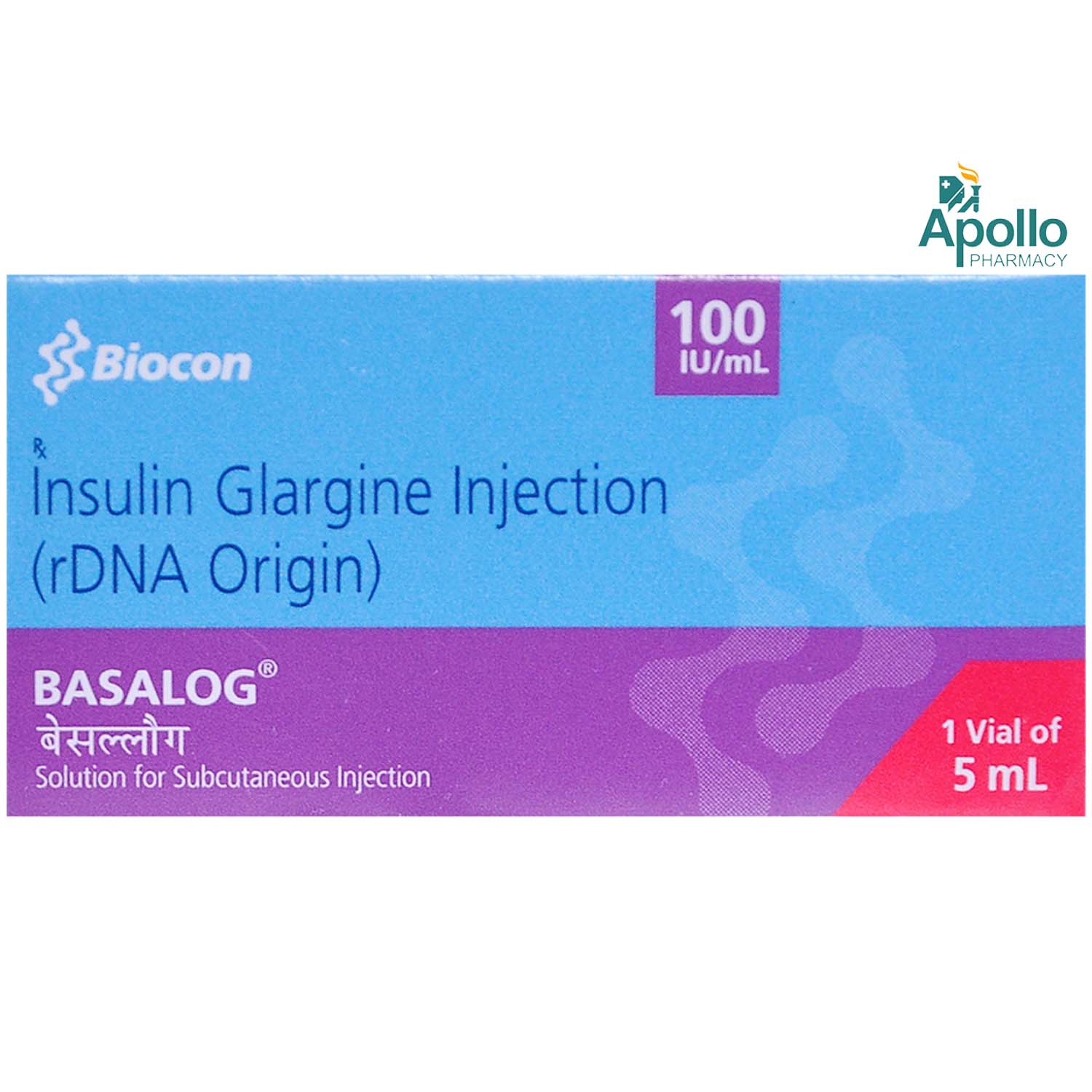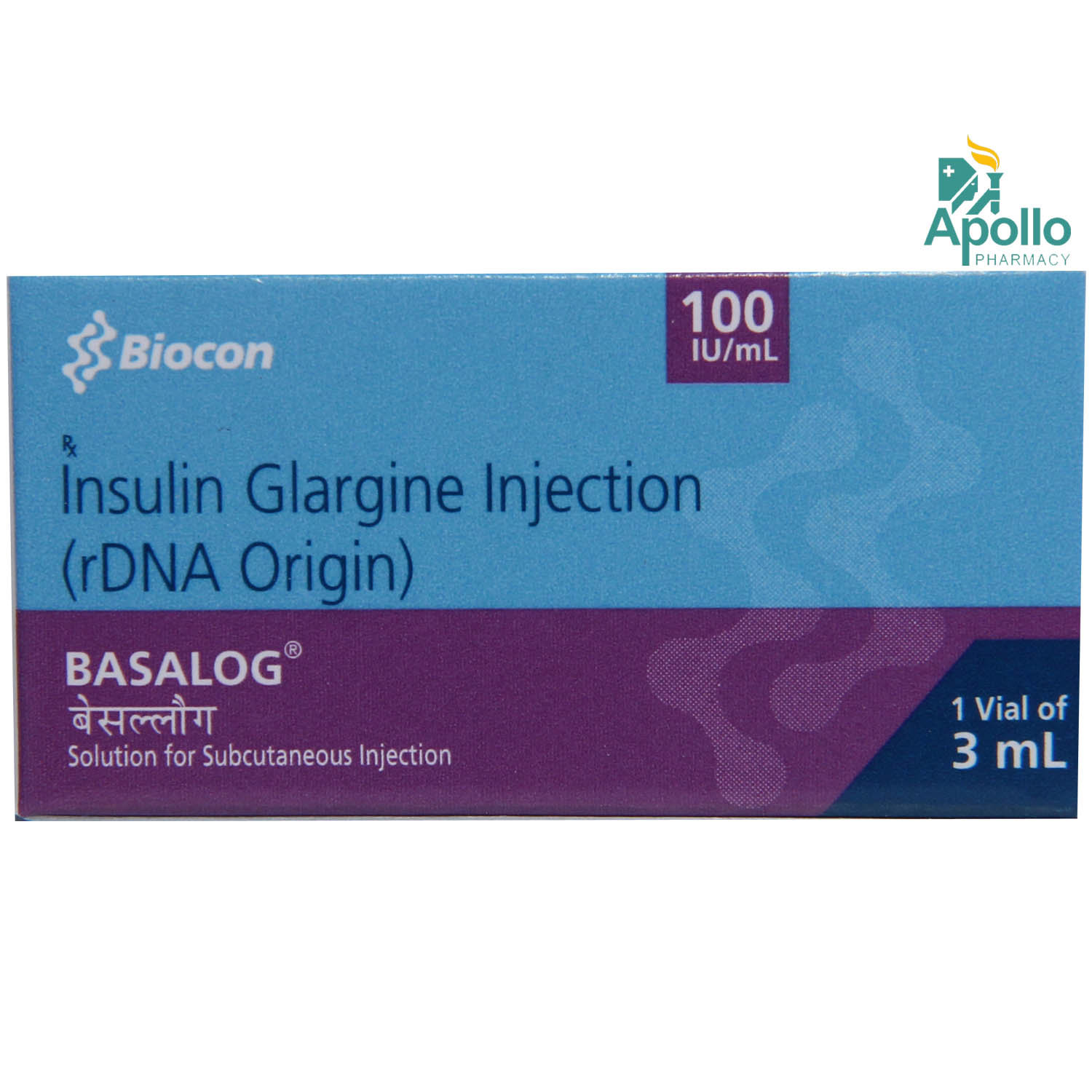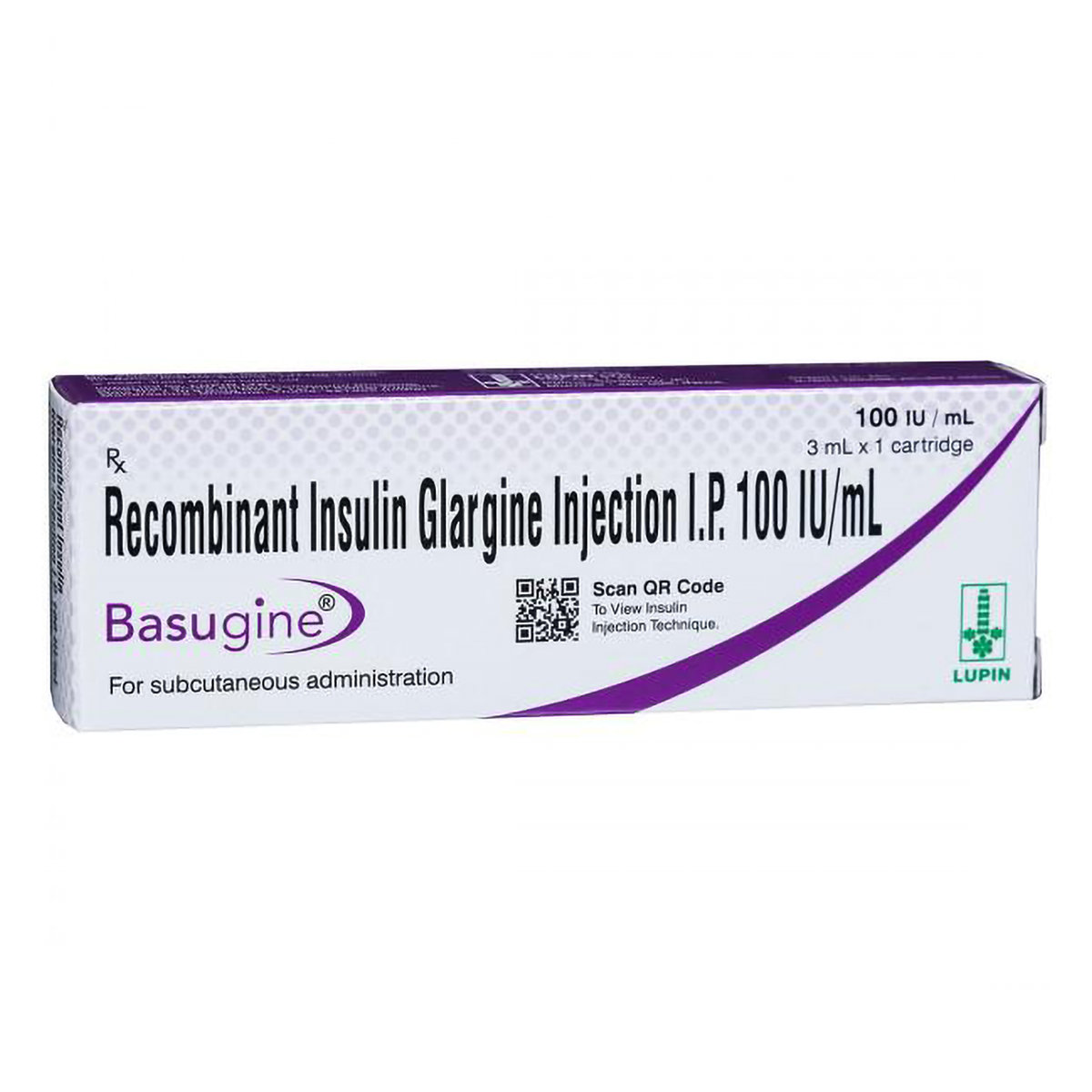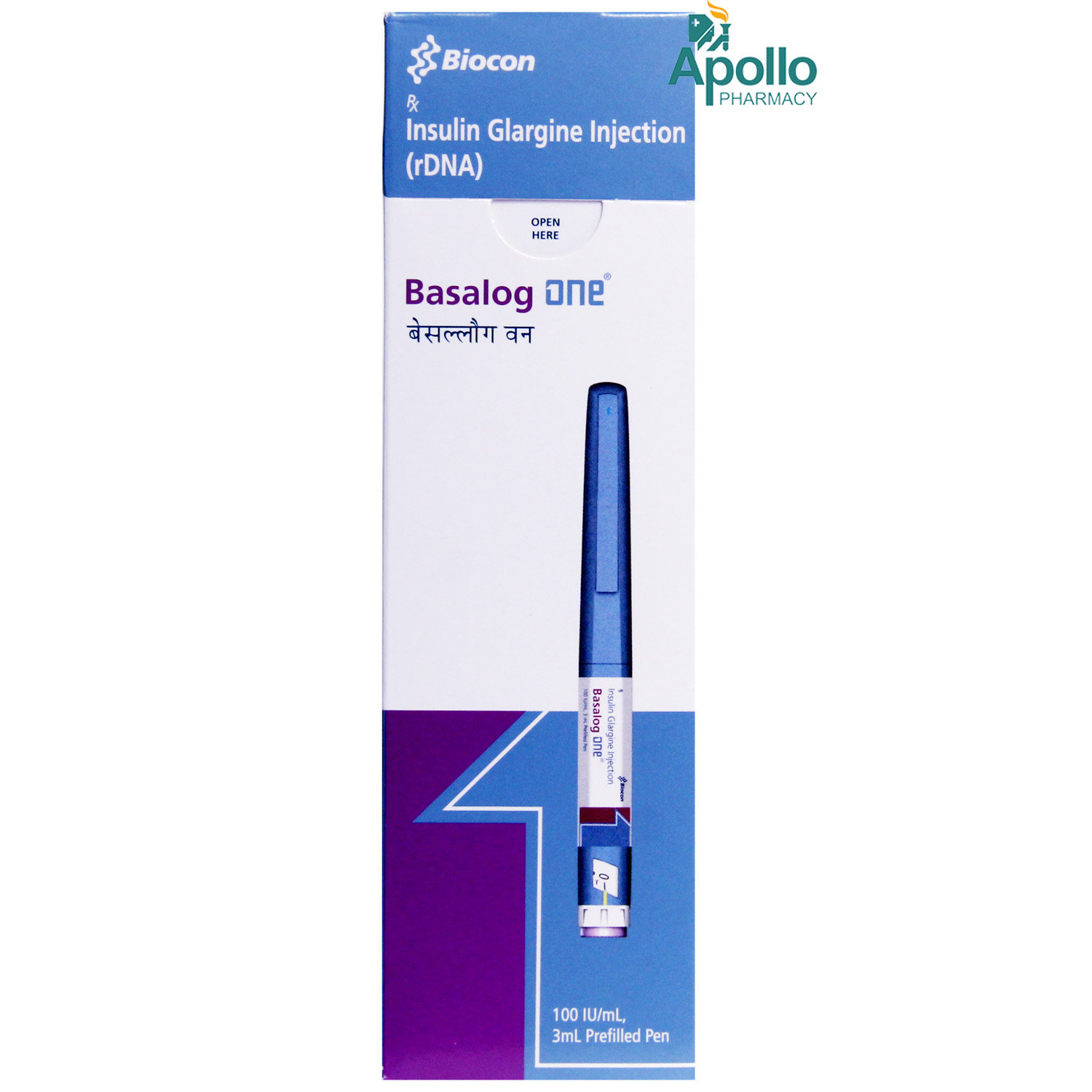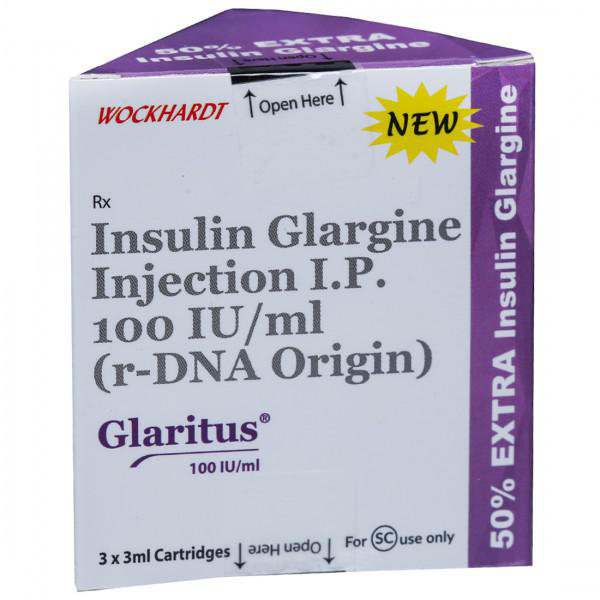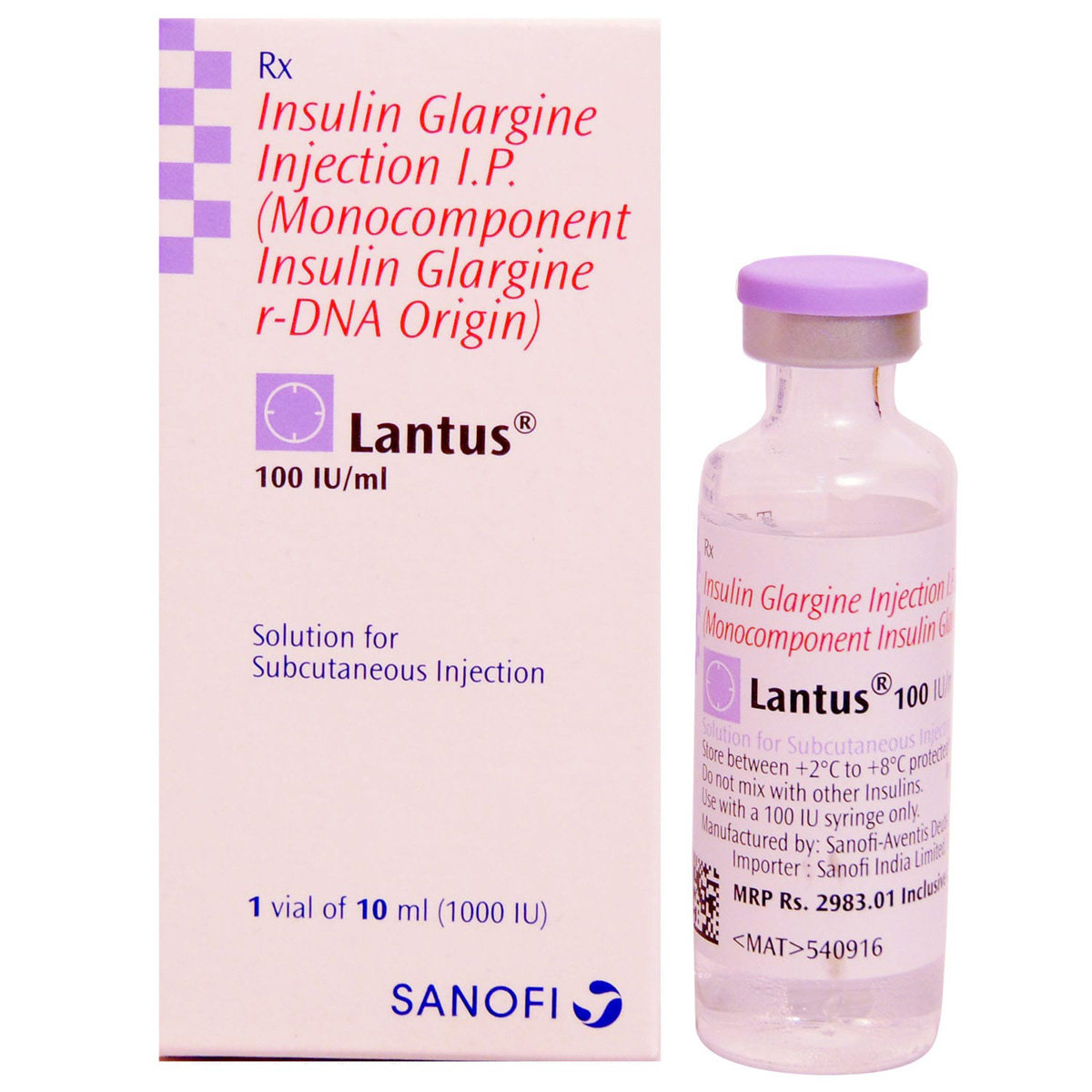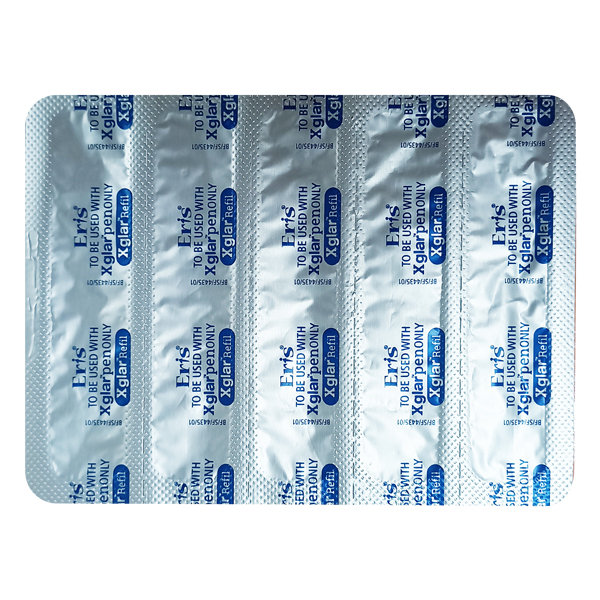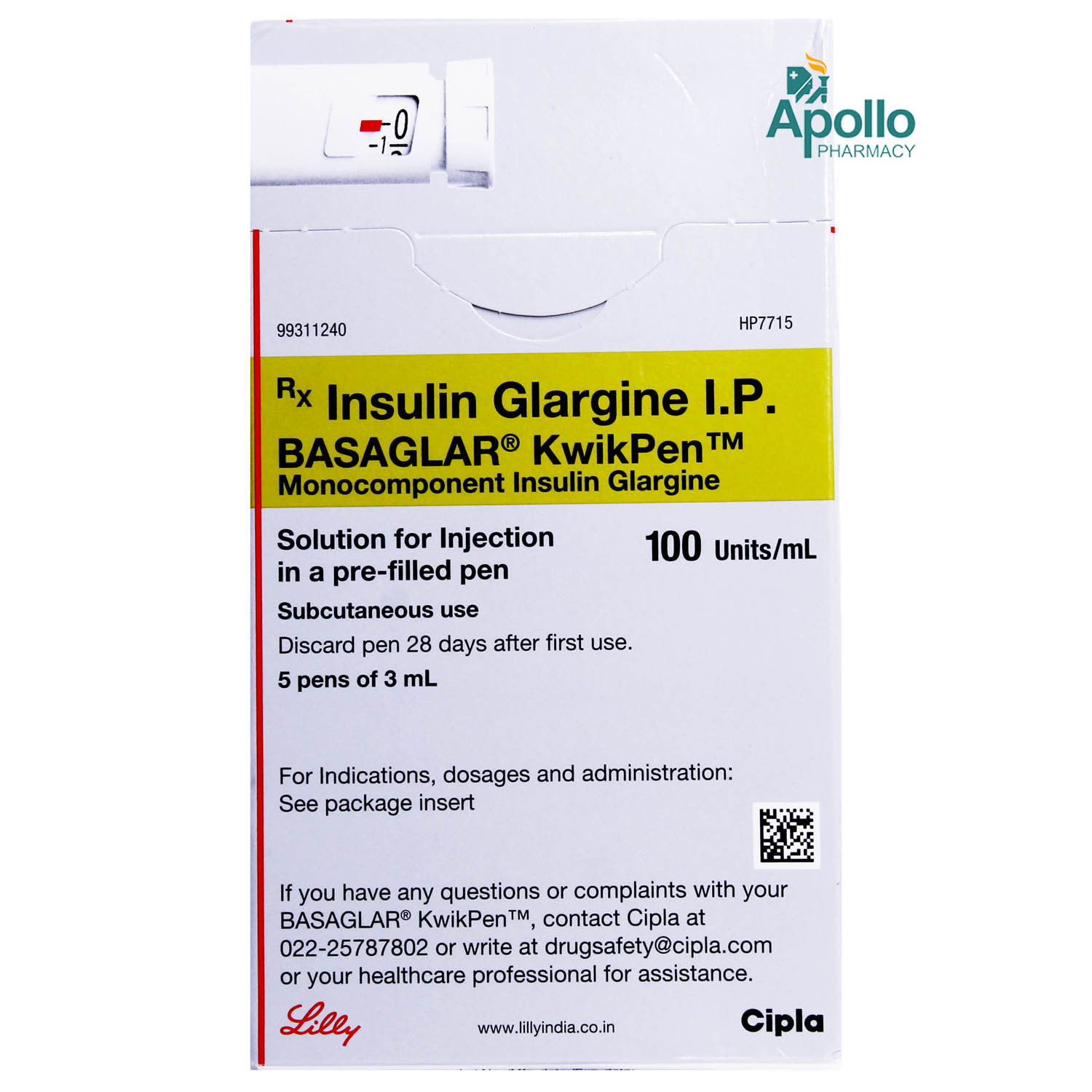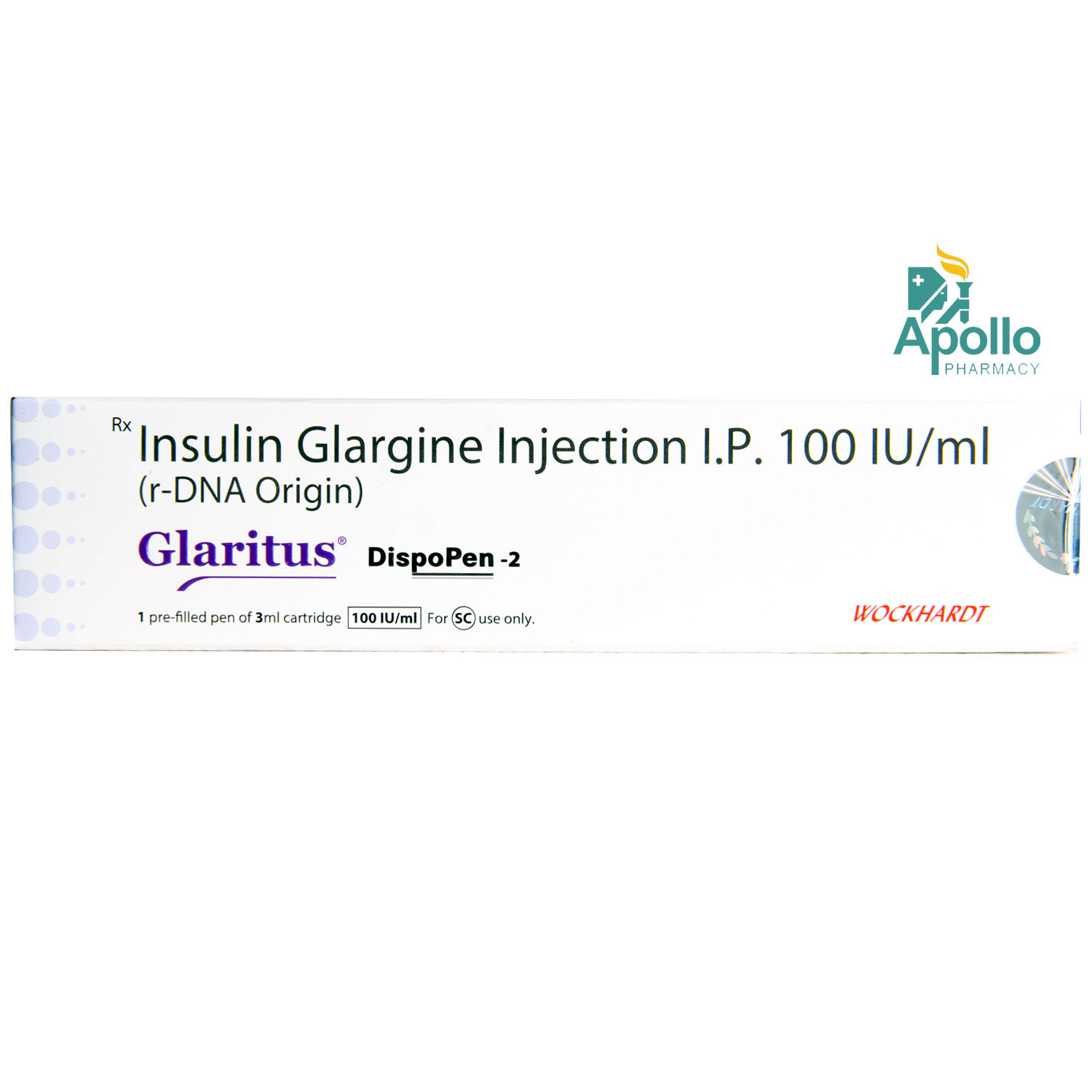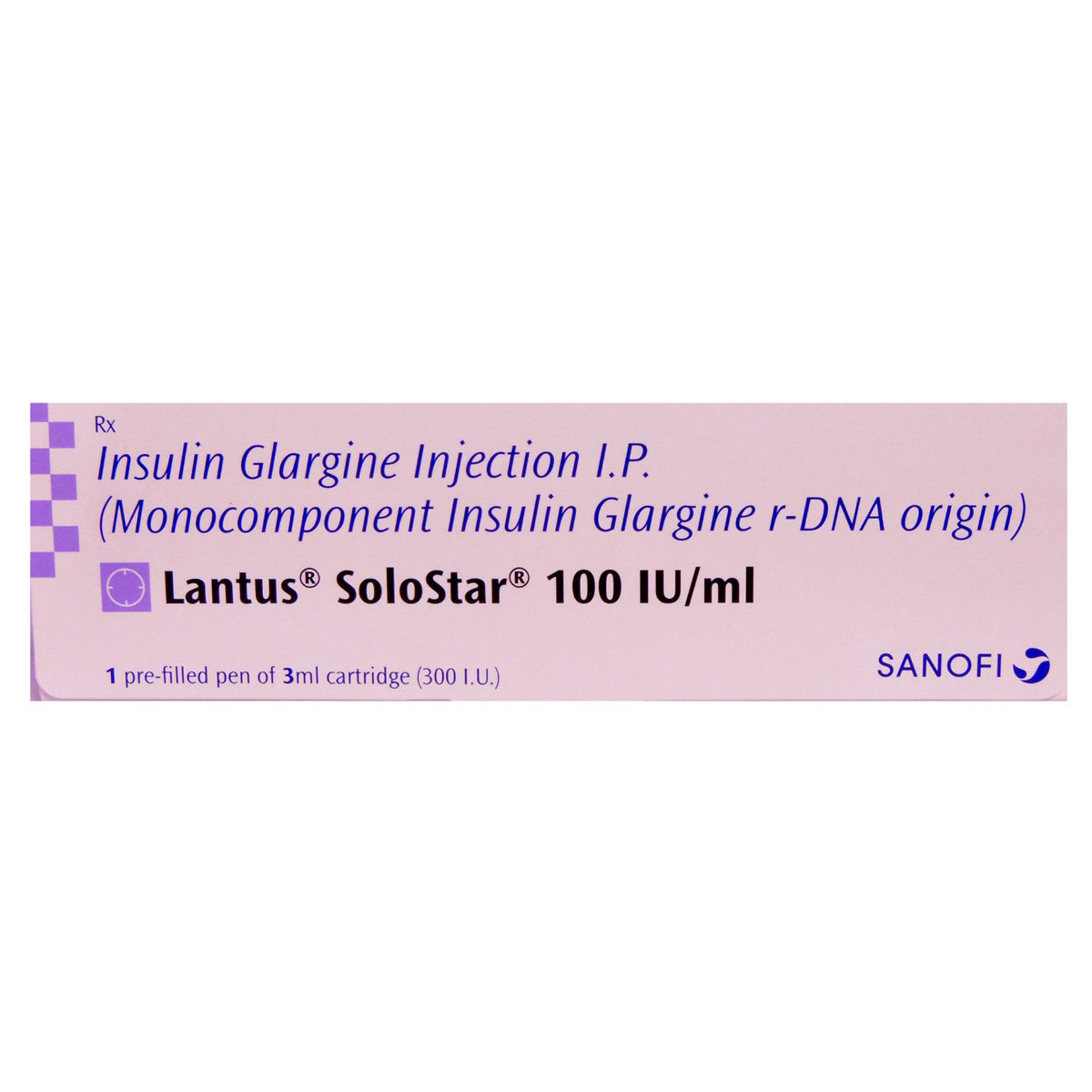Xglar One 100Iu/Ml Injection 3 ml
MRP ₹769
(Inclusive of all Taxes)
₹115.3 Cashback (15%)
Provide Delivery Location
Online payment accepted
 Prescription drug
Prescription drugWhats That
Composition :
Manufacturer/Marketer :
Consume Type :
Expires on or after :
Return Policy :
About Xglar One 100Iu/Ml Injection 3 ml
Xglar One 100Iu/Ml Injection 3 ml is a long-acting insulin that contains insulin glargine. This is a modified insulin, very similar to human insulin. Human insulin is the name which describes synthetic (human-made) insulin, which is laboratory grown to mimic the insulin in humans. Xglar One 100Iu/Ml Injection 3 ml is used to treat diabetes mellitus in adults, adolescents and children aged two years and above. Diabetes mellitus is a disease where your body does not produce enough insulin to control the level of blood sugar. Xglar One 100Iu/Ml Injection 3 ml has a long and steady blood-sugar-lowering action. Long-acting insulin takes about 2 hours to start acting and is designed to work uniformly so that there is no peak activity as such. The duration of long-acting insulin is up to 24 hours. Treatment with Xglar One 100Iu/Ml Injection 3 ml helps to prevent complications from your diabetes. Do not use Xglar One 100Iu/Ml Injection 3 ml to treat diabetic ketoacidosis (too much acid in the blood).
Xglar One 100Iu/Ml Injection 3 ml is a long-acting insulin that works by ensuring consistent sugar control. Hence, it helps lower blood sugar levels throughout the day. Based on your lifestyle, the results of your blood sugar (glucose) tests, and your previous insulin usage. Your doctor will advise you how much Xglar One 100Iu/Ml Injection 3 ml per day you will need and when you need to take it.
Sometimes, you may experience injection site reactions such as lumps under the skin. The injection site should be rotated to prevent skin changes such as lumps under the skin. You may also experience symptoms of hypoglycaemia (low blood sugar) such as sweating, clammy skin, anxiety, fast heartbeat. Most of these side effects of Xglar One 100Iu/Ml Injection 3 ml do not require medical attention and gradually resolve over time. However, if the side effects are persistent, reach out to your doctor.
Try not to stop taking Xglar One 100Iu/Ml Injection 3 ml of your own. Let your doctor know about this, as it may cause withdrawal symptoms. Do not take Xglar One 100Iu/Ml Injection 3 ml if you have any low blood glucose levels, kidney, liver, or heart problems, or problems with alcohol or other prescription recreational drugs. Along with Xglar One 100Iu/Ml Injection 3 ml, you should take a healthy diet, exercise regularly, and maintain weight as your doctor advises. Xglar One 100Iu/Ml Injection 3 ml is a cold chain medicine, so it must be stored in the refrigerator between 2-8 degrees Celsius; otherwise, its efficiency might get lost. Do not store it in the freezer of the fridge.
Uses of Xglar One 100Iu/Ml Injection 3 ml
Directions for Use
Key Benefits
Xglar One 100Iu/Ml Injection 3 ml has a long and steady blood-sugar-lowering action. Long-acting insulin takes about 2 hours to start acting and is designed to work uniformly so that there is no peak activity as such. The duration of long-acting insulin is up to 24 hours. This insulin causes body tissues to absorb glucose from the blood and decreases glucose production by the liver. Xglar One 100Iu/Ml Injection 3 ml helps in improving the glycaemic control, which in turn reduces the risk of progression of complications of diabetes like damage to the retina (retinopathy), impairment of kidney (nephropathy), injury of nerve cells (neuropathy), delayed wound healing, diabetic foot ulcer and others. Besides this, Xglar One 100Iu/Ml Injection 3 ml can be safely prescribed to pregnant and lactating mothers.
Storage
Drug Warnings
Xglar One 100Iu/Ml Injection 3 ml is for subcutaneous (under the skin) use only and should never be administered intravenously (IV) or in the veins. If you are changing the brand of insulin or if you need to inject your insulin by another method, it should be done under strict medical supervision. Cases of heart failure were reported when pioglitazone was used with insulin, especially in patients at high risk of cardiac heart failure. The first symptoms of hyperglycaemia (high blood sugar level) may include symptoms like excessive thirst, dry mouth, increased frequency of urination, nausea, vomiting, drowsiness, flushed dry skin, loss of appetite and acetone odour of the breath. You should closely monitor these symptoms. Symptoms like heart failure, weight gain and oedema (fluid deposition in tissue) should not be overruled. It is advisable not to consume alcohol as it may increase or decrease your blood glucose level. Care should be taken while travelling across more than two time zones. Your doctor may adjust your insulin schedule. Xglar One 100Iu/Ml Injection 3 ml may decrease the potassium level, leading to a state of hypokalaemia that, if left untreated, may lead to respiratory paralysis, irregular heartbeat rhythm, coma and even death. Do not take Xglar One 100Iu/Ml Injection 3 ml if you have any low blood glucose levels, kidney, liver, or heart problems, or problems with alcohol or other prescription recreational drugs.
Drug-Drug Interactions
Drug-Drug Interactions
Login/Sign Up
Taking Xglar One 100Iu/Ml Injection 3 ml with Moxifloxacin affects blood glucose levels, which may cause hyperglycemia (high blood sugar) and hypoglycemia (low blood sugar) less frequently.
How to manage the interaction:
Although taking Moxifloxacin and Xglar One 100Iu/Ml Injection 3 ml together can result in an interaction, it can be taken if a doctor has prescribed it. However, consult the doctor immediately if you experience headache, dizziness, and rapid heartbeat, increased thirst, and increased urination. Do not stop using any medications without talking to a doctor.
Taking Xglar One 100Iu/Ml Injection 3 ml with ciprofloxacin can effect blood sugar levels, both hyperglycemia (high blood sugar) and, less frequently, hypoglycemia (low blood sugar).
How to manage the interaction:
Although taking ciprofloxacin and Xglar One 100Iu/Ml Injection 3 ml together can possibly result in an interaction, it can be taken if your doctor has prescribed it. However, consult a doctor if you experience hypoglycemia, hyperglycemia, or a decline in blood glucose control. Hypoglycemia can cause headaches, dizziness, sleepiness, anxiety, confusion, shaking, nausea, hunger, weakness, sweating, palpitations, and a rapid heartbeat. Increased hunger, thirst, and urine are all possible signs of hyperglycemia. It is recommended to maintain blood glucose levels.
Co-administration of Ofloxacin and Xglar One 100Iu/Ml Injection 3 ml can sometimes have an effect on blood glucose levels.
How to manage the interaction:
Although combining Ofloxacin and Xglar One 100Iu/Ml Injection 3 ml can lead to an interaction, they can be taken on a doctor's advice. If you experience any symptoms of hypoglycemia (headache, dizziness, sleepiness, nervousness, confusion, shaking, nausea, loss of hunger, weakness, sweating, palpitation, and rapid heartbeat) or hyperglycemia (increased thirst, hunger, and urination), consult a doctor. Keep an eye on your blood glucose levels. Do not discontinue any medications without consulting a doctor.
Taking Xglar One 100Iu/Ml Injection 3 ml with nalidixic acid affects blood glucose levels, which may cause hyperglycemia (high blood sugar) and hypoglycemia (low blood sugar) less frequently.
How to manage the interaction:
Although taking nalidixic acid and Xglar One 100Iu/Ml Injection 3 ml together can possibly result in an interaction, it can be taken if your doctor has prescribed it. However, consult the doctor immediately if you experience hypoglycemia or hyperglycemia. Symptoms of hypoglycemia include headache, dizziness, drowsiness, nervousness, confusion, shaking, nausea, loss of hunger, weakness, sweating, palpitation, and rapid heartbeat. Symptoms of hyperglycemia may include increased thirst, increased hunger, and increased urination. Do not stop using any medications without first talking to your doctor.
Taking Xglar One 100Iu/Ml Injection 3 ml with gatifloxacin affects blood glucose levels, which may cause hyperglycemia (high blood sugar) and hypoglycemia (low blood sugar) less frequently.
How to manage the interaction:
Although taking Gatifloxacin and Xglar One 100Iu/Ml Injection 3 ml together can possibly result in an interaction, it can be taken if your doctor has prescribed it. However, consult the doctor immediately if you experience hypoglycemia or hyperglycemia. Symptoms of hypoglycemia include headache, dizziness, drowsiness, nervousness, confusion, shaking, nausea, hunger, weakness, sweating, palpitation, and rapid heartbeat. Symptoms of hyperglycemia may include increased thirst, increased hunger, and increased urination. Do not stop using any medications without first talking to your doctor.
Taking Xglar One 100Iu/Ml Injection 3 ml with sparfloxacin affects blood glucose levels, which may cause hyperglycemia (high blood sugar) and hypoglycemia (low blood sugar) less frequently.
How to manage the interaction:
Although taking Sparfloxacin and Xglar One 100Iu/Ml Injection 3 ml together can possibly result in an interaction, it can be taken if your doctor has prescribed it. However, consult the doctor immediately if you experience hypoglycemia or hyperglycemia. Symptoms of hypoglycemia include headache, dizziness, drowsiness, nervousness, confusion, shaking, nausea, hunger, weakness, sweating, palpitations, and rapid heartbeat. Symptoms of hyperglycemia may include increased thirst, increased hunger, and increased urination. Do not stop using any medications without first talking to your doctor.
Taking Xglar One 100Iu/Ml Injection 3 ml with cinoxacin affects blood glucose levels, which may cause hyperglycemia (high blood sugar) and hypoglycemia (low blood sugar) less frequently.
How to manage the interaction:
Although taking cinoxacin and Xglar One 100Iu/Ml Injection 3 ml together can possibly result in an interaction, it can be taken if your doctor has prescribed it. However, consult the doctor immediately if you experience hypoglycemia or hyperglycemia. Symptoms of hypoglycemia include headache, dizziness, drowsiness, nervousness, confusion, shaking, nausea, hunger, weakness, sweating, palpitation, and rapid heartbeat. Symptoms of hyperglycemia may include increased thirst, increased hunger, and increased urination. Do not stop using any medications without first talking to your doctor.
Taking Xglar One 100Iu/Ml Injection 3 ml with Trovafloxacin affects blood glucose levels, which may cause hyperglycemia (high blood sugar) and hypoglycemia (low blood sugar) less frequently.
How to manage the interaction:
Although taking Trovafloxacin and Xglar One 100Iu/Ml Injection 3 ml together can possibly result in an interaction, it can be taken if your doctor has prescribed it. However, consult the doctor immediately if you experience hypoglycemia or hyperglycemia. Symptoms of hypoglycemia include headache, dizziness, drowsiness, nervousness, confusion, shaking, nausea, loss of hunger, weakness, sweating, palpitation, and rapid heartbeat. Symptoms of hyperglycemia may include increased thirst, increased hunger, and increased urination. Do not stop using any medications without first talking to your doctor.
Blood glucose levels can be affected by levofloxacin when taken with Xglar One 100Iu/Ml Injection 3 ml. It may cause hyperglycemia (high blood glucose) and, less commonly, hypoglycemia (low blood glucose).
How to manage the interaction:
There could be a possible interaction between Xglar One 100Iu/Ml Injection 3 ml and Levofloxacin but can be taken if prescribed by a doctor. However, consult the doctor immediately if you experience symptoms of hypoglycemia, which include headache, dizziness, drowsiness, nervousness, confusion, tremor, nausea, hunger, weakness, perspiration, palpitation, and rapid heartbeat, or symptoms of hyperglycemia which may include increased thirst, increased hunger, and increased urination. Do not stop using any medications without talking to a doctor.
Taking Xglar One 100Iu/Ml Injection 3 ml with grepafloxacin affects blood glucose levels, which may cause hyperglycemia (high blood sugar) and hypoglycemia (low blood sugar) less frequently.
How to manage the interaction:
Although taking Grepafloxacin and Xglar One 100Iu/Ml Injection 3 ml together can possibly result in an interaction, it can be taken if your doctor has prescribed it. However, consult the doctor immediately if you experience hypoglycemia or hyperglycemia. Symptoms of hypoglycemia include headache, dizziness, drowsiness, nervousness, confusion, shaking, nausea, hunger, weakness, sweating, palpitation, and rapid heartbeat. Symptoms of hyperglycemia may include increased thirst, increased hunger, and increased urination. Do not stop using any medications without talking to a doctor.
Drug-Food Interactions
Drug-Food Interactions
Login/Sign Up
Diet & Lifestyle Advise
- Exercise may lower your body’s need for insulin during and sometimes after physical activity.
- Exercise may also speed up the effect of an insulin dose, especially if the activity involves the area of the injection site (for example, the leg should not be used for injection just before running).
- Discuss with your doctor how to adjust your insulin regimen to accommodate exercise.
- Avoid eating sugar food and prefer food cooked food low in calories.
- When travelling across more than two time zones, you should talk to your doctor concerning adjustments in your insulin schedule.
Side Effects of Xglar One 100Iu/Ml Injection 3 ml
- Low blood sugar or hypoglycaemia
- Cold sweat
- Cool pale skin
- Nervousness
- Anxious feeling
- Unusual tiredness or weakness
- Confusion
- Difficulty in concentration
- Drowsiness
- Excessive hunger
- Temporary vision changes
- Headache
- Nausea
- Increased pulse or heartbeat (palpitation)
Habit Forming
Therapeutic Class
All Substitutes & Brand Comparisons
RX
Out of StockBasugine 100IU Injection 10 ml
Lupin Ltd
₹594.8
(₹59.48/ 1ml)
76% CHEAPERRX
Nobeglar 100IU Injection 5 ml
Mankind Pharma Pvt Ltd
₹822
(₹144.68/ 1ml)
43% CHEAPERRX
Xglar 100Iu/Ml Injection 5 ml
Eris Life Sciences Ltd
₹878
(₹154.52/ 1ml)
39% CHEAPER
Author Details
We provide you with authentic, trustworthy and relevant information
Drug-Diseases Interactions
Drug-Diseases Interactions
Login/Sign Up
FAQs
Drug-Drug Interactions Checker List
- ASPIRIN
- SITAGLIPTIN
- PREGABALIN
- METOPROLOL
- LEVOTHYROXINE SODIUM
- CLONIDINE
- LITHIUM
- FLUOXETINE
- RIFAMPICIN+ISONIAZID
- CLOZAPINE
- OLANZAPINE
- FENOFIBRATE
- EPINEPHRINE
- SALBUTAMOL
- ESTROGEN
- PROGESTERONE
Special Advise
Change (rotate) your injection sites within the area you chose with each dose to reduce your risk of getting lipodystrophy (pitted or thickened skin) and localized cutaneous amyloidosis (skin with lumps) at the injection sites. Do not use the same spot for each injection or injection where the skin is pitted, thickened, lumpy, tender, bruised, scaly, hard, scarred or damaged.
Disease/Condition Glossary
Diabetes: Diabetes is a chronic or lifelong disease that prevents the body from utilizing insulin properly. Insulin is the hormone that controls sugar levels in the blood. Diabetes is a condition in which blood glucose levels are above normal. It is of two types, namely: type-1 and type-2 diabetes. Type-1 diabetes is a condition in which the pancreas produces little or no insulin. Type-2 diabetes affects the way body processes the sugar. Symptoms of diabetes include lack of energy, tiredness, frequent urination, excess thirst, dry mouth, blurry vision, constant hunger, weight loss, and itchy skin.

Have a query?
Alcohol
Safe if prescribed
You are recommended not to consume alcohol along with Xglar One 100Iu/Ml Injection 3 ml to avoid unpleasant side-effects. Alcohol may either decrease or increase the blood sugar level which can be fatal.
Pregnancy
Consult your doctor
Xglar One 100Iu/Ml Injection 3 ml can be used during pregnancy. Your insulin dose may need to be changed during pregnancy and after delivery. Please consult your doctor before taking Xglar One 100Iu/Ml Injection 3 ml.
Breast Feeding
Consult your doctor
Xglar One 100Iu/Ml Injection 3 ml can be given safely to nursing mothers but only under the supervision of a physician. Physician may adjustments in your insulin doses and your diet.
Driving
Safe if prescribed
Drive with caution, Xglar One 100Iu/Ml Injection 3 ml usually causes drowsiness and affects driving ability. Your ability to concentrate and react may be reduced if you have hypoglycaemia (low blood sugar).
Liver
Consult your doctor
Xglar One 100Iu/Ml Injection 3 ml to be taken with caution, especially if you have a history of liver diseases/conditions. The dose may have to be adjusted by your doctor.
Kidney
Consult your doctor
Xglar One 100Iu/Ml Injection 3 ml to be taken with caution, especially if you have a history of kidney diseases/conditions. The dose may have to be adjusted by your doctor.
Children
Safe if prescribed
Xglar One 100Iu/Ml Injection 3 ml can be given safely to children provided; dose has to be prescribed by a child specialist.

